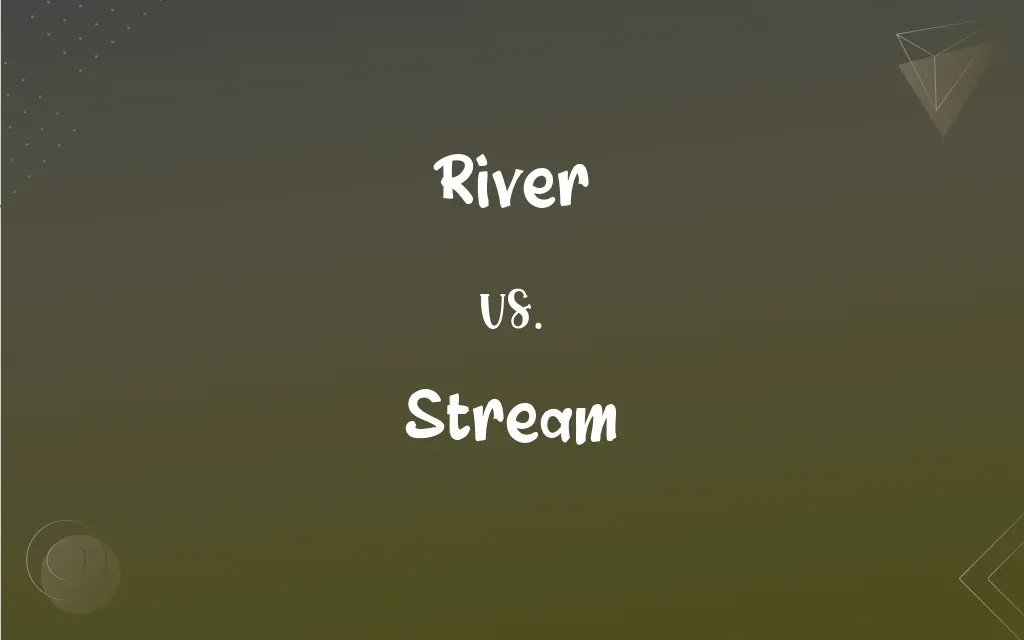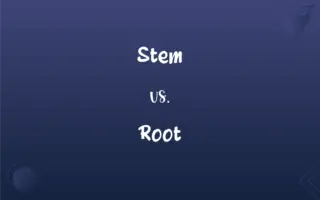River vs. Stream: What's the Difference?
Edited by Janet White || By Harlon Moss || Updated on October 12, 2023
A river is a large, flowing body of water, while a stream is a small, flowing body of water, often a tributary to a river. Both move towards an ocean, sea, or lake.

Key Differences
Rivers, by definition, are substantial natural water bodies that flow towards an ocean, sea, or another river, often facilitating ecosystems along their banks and beds. These extensive systems can traverse cities, states, or even countries, serving as vital water sources and transportation routes. Streams, however, could be thought of as their smaller counterparts, with diminished flow and typically covering less geographical area. Both river and stream possess distinguishable characteristics that mark their importance and roles in natural ecosystems.
The presence of a river can influence climate, biodiversity, and human societies, offering resources and acting as natural boundaries or routes. They usually have significant discharge, accommodating ships and boats in some cases, and can sculpt the landscape through erosion over time. Conversely, streams may not significantly shape geographical aspects, yet they play a crucial role in maintaining local ecosystems and providing water sources to smaller habitats. The presence of a stream in a particular locale often indicates a healthier local ecosystem, as it supports vegetation and wildlife.
In an ecological context, rivers tend to support a larger and more diverse ecosystem, given their size and the variety of habitats they provide. Many major cities and civilizations have developed along rivers due to their provision of water, food, and transportation. Streams, with their delicate flow and limited spread, contribute to local ecosystems in a more subtle manner. They nourish the land through which they flow and provide habitats for smaller, often specialized, ecosystems. Both river and stream hold intrinsic ecological and environmental value, irrespective of their size.
The distinction between a river and a stream can sometimes blur since streams can grow into rivers and vice versa, primarily through processes like erosion, weather events, or human intervention. The terminology might also depend on regional vernacular; what is considered a river in one place might be deemed a stream in another. Despite their differences, both river and stream contribute profoundly to the sustenance of ecosystems, acting as lifelines for numerous species, including humans.
Comparison Chart
Size
Larger and wider, often navigable
Smaller and narrower, typically not navigable
ADVERTISEMENT
Ecosystem
Supports a larger, more diverse ecosystem
Supports smaller, often localized ecosystems
Geographical Span
Can span across countries or continents
Typically spans smaller geographical areas
Impact
Can shape geographical landscapes through erosion
Less impact on geographical shaping
Usage
Often used for transportation, irrigation, and power generation
Primarily aids in local ecosystems and provides water to habitats
River and Stream Definitions
River
A river is a large, natural stream of flowing water.
The Amazon River, which flows through South America, is by volume the world's largest river.
ADVERTISEMENT
Stream
A small, narrow body of flowing freshwater.
The children loved throwing pebbles into the gentle stream.
River
In metaphorical terms, "river" can symbolize a bountiful source or flow of something.
The poet described the river of emotions flooding through him during the concert.
Stream
To transmit or receive data continuously over the internet.
I usually stream my favorite TV shows online.
River
The "river" in card games refers to the final card dealt in certain poker games.
He drew an ace on the river, completing a winning hand in the poker game.
Stream
To arrange or categorize in a particular division or level.
The students were streamed according to their abilities.
River
"River" can refer to a massive volume or abundance of items or things in motion.
A river of protestors flowed through the city streets, advocating for change.
Stream
A continuous flow of liquid, gas, or particles.
A steady stream of traffic kept the road busy all day.
River
In idiomatic usage, to "sell [someone] down the river" means to betray them.
After promising a promotion, the manager sold her down the river by giving the position to someone else.
Stream
A constant succession of things or people.
A stream of visitors came to see the new exhibit.
River
Abbr. R. A large natural stream of water emptying into an ocean, lake, or other body of water and usually fed along its course by converging tributaries.
Stream
A flow of water in a channel or bed, as a brook, rivulet, or small river.
River
A stream or abundant flow
A river of tears.
Stream
A steady current in such a flow of water.
FAQs
Can a river flow into a stream?
Typically no, since rivers are larger than streams, they usually flow into larger bodies like oceans, seas, or lakes.
What is the source of a river?
The source of a river is its origin or starting point, which could be a spring, lake, or glacier.
Is it safe to drink directly from a stream?
Not always, as streams can contain harmful bacteria or pollutants, always prioritize treating water before drinking.
What is a river?
A river is a large, flowing body of water that usually empties into a sea or ocean.
How does urbanization affect streams?
Urbanization can cause pollution, alter flow patterns, and disrupt local ecosystems in and around streams.
What is a river basin?
A river basin includes all the land drained by a river and its tributaries.
Can a river be man-made?
Yes, there are artificial or man-made rivers, often created for irrigation or navigation purposes.
What is streamflow?
Streamflow refers to the flow of water in a natural or artificial channel, like a stream.
Can rivers freeze?
Yes, rivers can freeze, particularly in regions with cold winter temperatures.
How are streams formed?
Streams are typically formed by runoff from rainfall or melting snow, flowing downhill due to gravity.
Can a stream be part of a river?
Yes, streams can feed into rivers, contributing to their water flow.
What defines a river's course?
A river's course is defined by its path from the source through to its mouth, including all the twists and turns.
How do rivers affect ecosystems?
Rivers provide water, transportation for species, and create habitats, significantly influencing local ecosystems.
What is the longest river in the world?
The Nile River in Africa is traditionally considered the world’s longest river.
Are streams significant to ecosystems?
Yes, streams provide hydration, habitats, and transportation routes in many ecosystems.
Why do rivers sometimes change course?
Rivers can change course due to erosion, tectonic activity, or human intervention.
Are all streams freshwater?
Most streams are freshwater, but there can be exceptions like brackish streams near coastal areas.
How is a stream different from a river?
Generally, a stream is smaller than a river, both in width and depth.
Why do streams flow downhill?
Streams flow downhill due to gravity, moving from areas of higher elevation to lower elevation.
What causes a river to dry up?
A river can dry up due to drought, over-extraction of water, or changes in its course.
About Author
Written by
Harlon MossHarlon is a seasoned quality moderator and accomplished content writer for Difference Wiki. An alumnus of the prestigious University of California, he earned his degree in Computer Science. Leveraging his academic background, Harlon brings a meticulous and informed perspective to his work, ensuring content accuracy and excellence.
Edited by
Janet WhiteJanet White has been an esteemed writer and blogger for Difference Wiki. Holding a Master's degree in Science and Medical Journalism from the prestigious Boston University, she has consistently demonstrated her expertise and passion for her field. When she's not immersed in her work, Janet relishes her time exercising, delving into a good book, and cherishing moments with friends and family.
































































